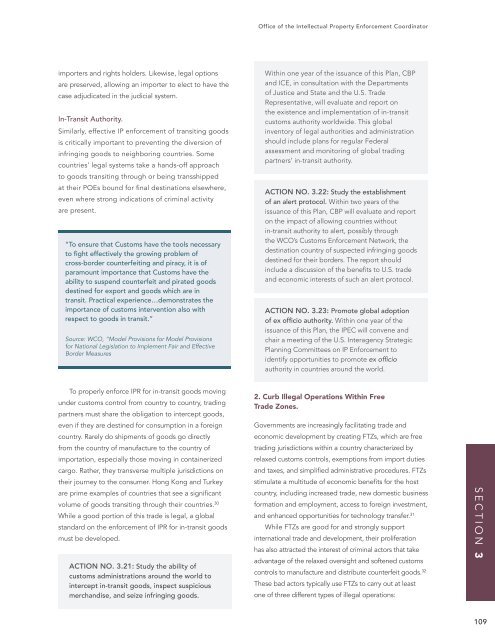ENFORCEMENT
eop_ipec_jointstrategicplan_hi-res
eop_ipec_jointstrategicplan_hi-res
Create successful ePaper yourself
Turn your PDF publications into a flip-book with our unique Google optimized e-Paper software.
Office of the Intellectual Property Enforcement Coordinator<br />
importers and rights holders. Likewise, legal options<br />
are preserved, allowing an importer to elect to have the<br />
case adjudicated in the judicial system.<br />
In-Transit Authority.<br />
Similarly, effective IP enforcement of transiting goods<br />
is critically important to preventing the diversion of<br />
infringing goods to neighboring countries. Some<br />
countries’ legal systems take a hands-off approach<br />
to goods transiting through or being transshipped<br />
at their POEs bound for final destinations elsewhere,<br />
even where strong indications of criminal activity<br />
are present.<br />
“To ensure that Customs have the tools necessary<br />
to fight effectively the growing problem of<br />
cross-border counterfeiting and piracy, it is of<br />
paramount importance that Customs have the<br />
ability to suspend counterfeit and pirated goods<br />
destined for export and goods which are in<br />
transit. Practical experience…demonstrates the<br />
importance of customs intervention also with<br />
respect to goods in transit.”<br />
Source: WCO, “Model Provisions for Model Provisions<br />
for National Legislation to Implement Fair and Effective<br />
Border Measures<br />
Within one year of the issuance of this Plan, CBP<br />
and ICE, in consultation with the Departments<br />
of Justice and State and the U.S. Trade<br />
Representative, will evaluate and report on<br />
the existence and implementation of in-transit<br />
customs authority worldwide. This global<br />
inventory of legal authorities and administration<br />
should include plans for regular Federal<br />
assessment and monitoring of global trading<br />
partners’ in-transit authority.<br />
ACTION NO. 3.22: Study the establishment<br />
of an alert protocol. Within two years of the<br />
issuance of this Plan, CBP will evaluate and report<br />
on the impact of allowing countries without<br />
in-transit authority to alert, possibly through<br />
the WCO’s Customs Enforcement Network, the<br />
destination country of suspected infringing goods<br />
destined for their borders. The report should<br />
include a discussion of the benefits to U.S. trade<br />
and economic interests of such an alert protocol.<br />
ACTION NO. 3.23: Promote global adoption<br />
of ex officio authority. Within one year of the<br />
issuance of this Plan, the IPEC will convene and<br />
chair a meeting of the U.S. Interagency Strategic<br />
Planning Committees on IP Enforcement to<br />
identify opportunities to promote ex officio<br />
authority in countries around the world.<br />
To properly enforce IPR for in-transit goods moving<br />
under customs control from country to country, trading<br />
partners must share the obligation to intercept goods,<br />
even if they are destined for consumption in a foreign<br />
country. Rarely do shipments of goods go directly<br />
from the country of manufacture to the country of<br />
importation, especially those moving in containerized<br />
cargo. Rather, they transverse multiple jurisdictions on<br />
their journey to the consumer. Hong Kong and Turkey<br />
are prime examples of countries that see a significant<br />
volume of goods transiting through their countries. 30<br />
While a good portion of this trade is legal, a global<br />
standard on the enforcement of IPR for in-transit goods<br />
must be developed.<br />
ACTION NO. 3.21: Study the ability of<br />
customs administrations around the world to<br />
intercept in-transit goods, inspect suspicious<br />
merchandise, and seize infringing goods.<br />
2. Curb Illegal Operations Within Free<br />
Trade Zones.<br />
Governments are increasingly facilitating trade and<br />
economic development by creating FTZs, which are free<br />
trading jurisdictions within a country characterized by<br />
relaxed customs controls, exemptions from import duties<br />
and taxes, and simplified administrative procedures. FTZs<br />
stimulate a multitude of economic benefits for the host<br />
country, including increased trade, new domestic business<br />
formation and employment, access to foreign investment,<br />
and enhanced opportunities for technology transfer. 31<br />
While FTZs are good for and strongly support<br />
international trade and development, their proliferation<br />
has also attracted the interest of criminal actors that take<br />
advantage of the relaxed oversight and softened customs<br />
controls to manufacture and distribute counterfeit goods. 32<br />
These bad actors typically use FTZs to carry out at least<br />
one of three different types of illegal operations:<br />
SECTION 3<br />
109


